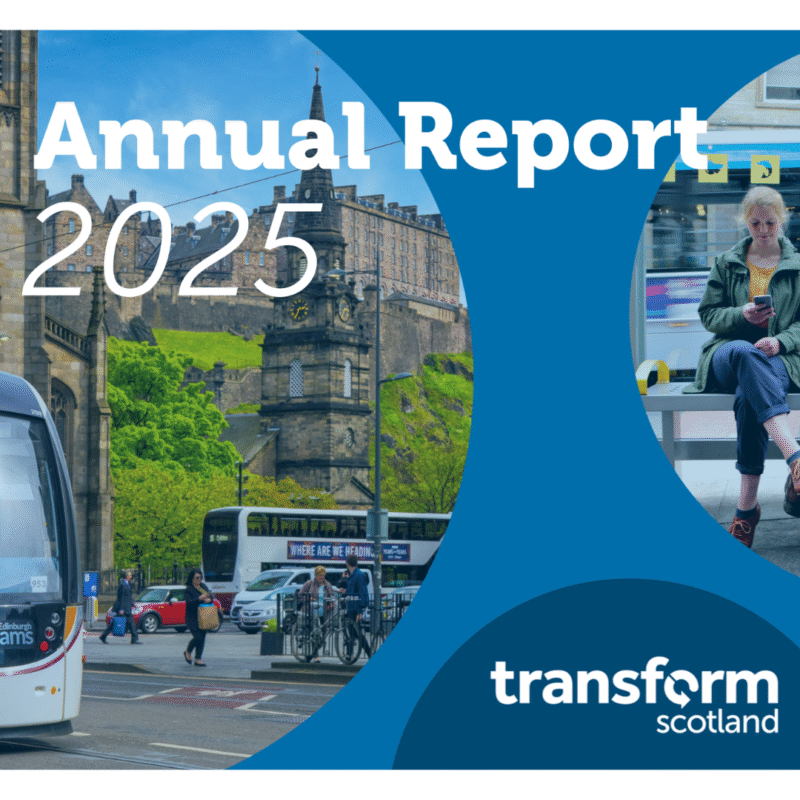Public affairs manager Laura Hyde-White reports on the Scottish Parliament’s Cross Party Group (CPG) on Sustainable Transport’s most recent meeting on ‘Women & Transport’.
This December, the CPG on Sustainable Transport held its third session in its series exploring transport inequalities. This month, discussions centred on two pressing themes: ensuring women and girls’ safety on public transport and the role of gender-responsive budgeting in making transport systems work better for everyone.
The session featured expert insights from Transport Scotland and the Scottish Women’s Budget Group, with a lively discussion highlighting the challenges, opportunities, and next steps for creating a fairer and more inclusive transport system in Scotland.

Women’s safety
Catherine Heeney of Transport Scotland shared insights into ongoing efforts to improve women and girls’ safety on public transport, an issue highlighted by then Transport Minister Jenny Gilruth MSP in 2022. These efforts have since produced an award-winning report and practical recommendations for safer travel environments for all.
Key findings from the research:
- Economic dependency: Many women rely on public transport as their sole travel option but face barriers such as poor service provision
- Cultural and structural risks: Public transport environments are often viewed as ‘crime attractors,’ with insufficient oversight or lighting contributing to feelings of insecurity
- Psychological impacts: Women frequently normalise harassment or feel responsible for their own safety, highlighting a need for cultural change
Transport Scotland’s safety recommendations include consulting directly with women, simplifying incident reporting, and promoting best practices across transport operators. Catherine flagged the new webpage, launched during the “16 Days of Activism” campaign, which summarises Transport Scotland’s work in this area and acts as a resource to encourage awareness and action on transport safety.
Gender budgeting in transport
Heather Williams of the Scottish Women’s Budget Group (SWBG) introduced the concept of gender budgeting, which evaluates how financial decisions influence inequality. In the transport sector, gender budgeting highlights the gaps between infrastructure designed for “men’s modal journeys” (commuting) and the needs of women, whose journeys often involve caregiving responsibilities and trip-chaining.
Heather reported on recent surveys by SWBG, highlighting key issues such as:
- Financial constraints: 26% of women struggle with transport costs, with single parents, disabled individuals, and rural residents most affected
- Active travel challenges: Safety concerns and poorly designed infrastructure deter many women from walking or cycling
- Car dependency: Women frequently rely on cars, as public transport and active travel infrastructure fail to meet their needs
Amongst other things, Heather encouraged more scrutiny of metrics for sustainable transport delivery. For example, in active travel, she noted that there has traditionally been a disproportionate focus on kilometres of cycle path built instead of asking ‘Where do those kilometres go? Do they take us to where we need to be? Do they take us to school? The doctors? The supermarket?’. She proposed that we shift away from measuring outputs like kilometres of cycle path built–and towards outcomes that recognise care-related journeys and improve people’s daily lives.
Her recommendations include prioritising care-related journeys, conducting detailed equality assessments, and actively involving women and other underrepresented groups in decision-making.
Breaking down barriers: Key themes from the discussion
The session concluded with a Q&A segment with the speakers which touched on several themes:
The Q&A session explored essential themes for improving transport safety and accessibility, focusing on addressing the needs of women and vulnerable groups. The discussions revealed systemic gaps in infrastructure and planning, alongside clear paths forward to create a more inclusive and equitable transport system.
From dialogue to direct action
The importance of transitioning from research and discussion to tangible changes and policies was emphasised, with calls for integrating resources and training into transport strategies.
The gendered impact of transport policy
Existing transport policies were criticised for deepening inequality. The lack of viable alternatives to car travel disproportionately affects women. The Group noted the example of new housing developments often embedding car-dependency with a lack of active or public transport routes to amenities included in the planning proposals.
The role of data
Better data collection and gender-sensitive analysis are critical for crafting policies that improve people’s everyday lives. Concerns were raised about the time and resources required for data collection, with some arguing that sufficient evidence already exists internationally to guide action.
Improving frameworks
Questions were raised about the effectiveness of current road-building projects and the need for more sustainable, equity-focused alternatives that align with broader social and environmental goals. It was agreed that the integration of transport considerations into planning and legislative frameworks is essential.
Prioritising community and behaviour change
Community engagement and behaviour change programmes emerged as key tools in promoting safer and more inclusive transport. Learning from international best practices, such as Stockholm’s integration of safe walking routes, was highlighted as a way to foster confidence and reduce the culture of fear surrounding public spaces.
Overcoming systemic disconnect
The disconnect between transport funding and desired outcomes, such as safety, equity, and sustainability, was underscored. Achieving meaningful change requires aligning resources with these priorities and fostering collaboration across stakeholders.
Up next for the CPG
CPG convenor, Graham Simpson MSP, closed the meeting with a reminder that the next session, scheduled for February 2025, will focus on transport inequalities experienced by people with disabilities. A final event and report will follow in spring 2025, wrapping up the series on tackling transport inequalities.
By spotlighting women’s safety and gender equality, this month’s meeting made clear that sustainable transport isn’t just about reducing emissions—it’s about creating a system that works for everyone.



